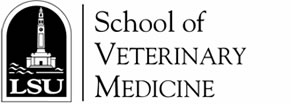Veterinary Medical Community on the Forefront of Hurricane Relief

Ginger Guttner - Office of Public Relations - Veterinary Medicine Building - Baton Rouge, LA 70803
Telephone: 225.578.9922 - Facsimile: 225.578.9916 - www.vetmed.lsu.edu - gguttner@vetmed.lsu.edu
For Immediate Release: September 16, 2005
BATON ROUGE—The veterinary community in Louisiana has stepped forward to care for the forgotten refugees, namely the thousands of animals that were evacuated with their owners or were left behind in the wake of Hurricane Katrina. The Louisiana Department of Agriculture & Forestry, the Louisiana Society for the Prevention of Cruelty to Animals (LA/SPCA), the Louisiana Veterinary Medical Association ( LVMA), the Louisiana Animal Control Association (LACA), and the LSU School of Veterinary Medicine (SVM) are managing animal evacuations and recovery plans for New Orleans pets and displaced animals.
LSU School of Veterinary Medicine
- The LSU School of Veterinary Medicine, along with local and out-of-state veterinarians and veterinary technicians, is providing volunteer veterinary care at animal shelters at the LSU AgCenter’s John M. Parker Coliseum and the Lamar-Dixon Expo Center. Approximately 1,000 pets are currently being sheltered at the Parker Coliseum. The shelter reached its peak on September 12 with a total of 1,287 pets.
- Veterinarians, veterinary technicians, and veterinary students from the LSU School of Veterinary Medicine have donated countless hours to the shelters since their inception. Additional volunteers have come from veterinary clinics and schools from all across the country and Canada. The School of Veterinary Medicine has set up sleeping areas in the Veterinary Medicine Building for some of these volunteers.
- The LSU School of Veterinary Medicine has created an educational block in shelter medicine for its fourth-year students so that they can get credit for time spent in the animal shelter.
- The School’s Veterinary Teaching Hospital has operated its intensive care unit 24/7 at near capacity and, at times, over capacity to accommodate shelter animals. A secondary ICU has been set up to handle these additional cases, many of which the hospital is treating at its own expense.
Lamar-Dixon Expo Center
- The LSU School of Veterinary Medicine Equine Clinic established the Horse Hurricane Helpline on Thursday September 1 st and faculty, staff and students began fielding countless calls around the clock from people reporting horses in need of rescue. The LSU Hurricane Equine Rescue Operations began assembling rescue teams comprised of veterinarians and staff from the LSU Equine Clinic, private equine veterinarians and numerous volunteers, often times consisting of a convoy of several trucks and trailers. We deployed between 1 and 7 teams daily beginning on Friday September 2 nd once we were granted access into the affected areas, and these rescue teams have continued through today.
- In addition, the Hurricane Equine Rescue Operations teams have rescued over 300 dogs, several cats and some birds, goats, iguanas and even a couple of people. The group also hauled feed and water for horses, livestock, rabbits, birds, dogs and cats into these areas and also took two truckloads of food and supplies, including generators, for the people that remained behind in areas in St. Bernard and Plaquemines parishes to help care for the horses and other animals.
LSU AgCenter’s Parker Coliseum
- The LSU AgCenter’s John M. Parker Coliseum is a shelter for owned pets, meaning that owners who evacuated brought their pets to the shelter or they were brought in by veterinarians who had to evacuate clinics in the areas affected by Hurricane Katrina. Lamar-Dixon is serving as a shelter for rescued animals.
- The shelters at Parker Coliseum and Lamar-Dixon have been open for 24 hours, 7 days a week since August 31. Parker Coliseum took in over 500 pets within the first 48 hours of operation.
- People from all across the country have sent thousands of pounds of pet food and other supplies to help in the animal recovery and shelter efforts.
- The majority of the pets coming into Parker Coliseum have been dogs, followed closely by cats. However, the Coliseum has also sheltered a pig, ducks, chickens, ferrets, mice, birds, and tortoises.
The LSU Emergency Animal Shelter will stop accepting new animals on September 30, 2005, and the operation will close on October 15, 2005. Owners must reclaim their animals by September 30, 2005, or give consent for foster care or adoption. If you need help finding a temporary foster home for your pet, or to release your pet for permanent adoption, please call 225-578-6111; or in Baton Rouge, come by Parker Coliseum and ask for details at the Fostering Desk.
Media Contact:
Ginger Guttner
LSU School of Veterinary Medicine
225.578.9922
gguttner@vetmed.lsu.edu
The mission of the LSU School of Veterinary Medicine is to provide superior education in veterinary medicine and related fields, to offer a wide range of superior services to the general public and the veterinary medical community, and to maintain a relevant, high-quality research program in basic and applied fields.